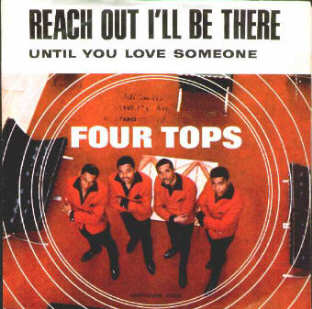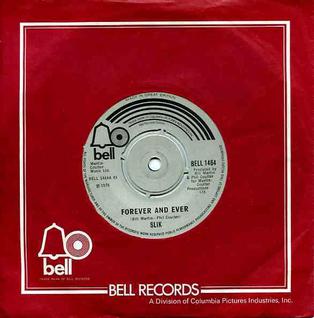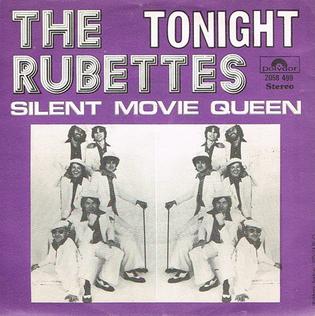
The Rubettes are an English pop/glam rock band put together in 1974 after the release of "Sugar Baby Love", a recording assembled of studio session musicians in 1973 by the songwriting team of Wayne Bickerton, the then head of A&R at Polydor Records, and his co-songwriter, Tony Waddington after their doo-wop and 1950s American pop-influenced songs had been rejected by a number of existing acts. Waddington paired the group with manager John Morris, the husband of singer Clodagh Rodgers and under his guidance, the band duly emerged at the tail end of the glam rock movement, wearing trademark white suits and cloth caps on stage. Their first release, "Sugar Baby Love" was an instant hit remaining at number one in the United Kingdom for four weeks in May 1974, while reaching number 37 on the US chart that August, and remains their best-known record. Subsequent releases were to be less successful, but the band continued to tour well into the 2000s with two line-ups in existence.

"Reach Out I'll Be There" (also formatted as "Reach Out (I'll Be There)") is a song recorded by American vocal quartet Four Tops from their fourth studio album, Reach Out (1967). Written and produced by Motown's main production team, Holland–Dozier–Holland, the song is one of the most widely-known Motown hits of the 1960s and is today considered the Four Tops' signature song.

"Nights on Broadway" is a song by the Bee Gees from the Main Course album released in 1975. The second single released from the album, it immediately followed their number-one hit "Jive Talkin'". This track was credited to Barry, Robin and Maurice Gibb.

"Jive Talkin'" is a song by the Bee Gees, released as a single in May 1975 by RSO Records. This was the lead single from the album Main Course and hit number one on the Billboard Hot 100; it also reached the top-five on the UK Singles Chart in the middle of 1975. Largely recognised as the group's comeback song, it was their first US top-10 hit since "How Can You Mend a Broken Heart" (1971).

"Tragedy" is a song released by the Bee Gees, written by Barry, Robin & Maurice Gibb, included on their 1979 album Spirits Having Flown. The single reached number one in the UK in February 1979 and repeated the feat the following month on the US Billboard Hot 100. In 1998, it was covered by British pop group Steps, whose version also reached number one in the UK. In 2024, it was used in the film Beetlejuice Beetlejuice, as well as the trailer.

"Forever and Ever" is a UK number-one single by Scottish glam rock band Slik, released in 1975. It was number one for one week in February 1976, knocking ABBA's "Mamma Mia" off the number-one position. It was also a hit in Ireland, reaching number two on the charts there. The song was written by the songwriting partnership of Bill Martin and Phil Coulter who had recently stopped writing for the Bay City Rollers.
"Don't Leave Me This Way" is a song written by Kenneth Gamble, Leon Huff and Cary Gilbert. It was originally released in 1975 by Harold Melvin & the Blue Notes featuring Teddy Pendergrass, an act signed to Gamble & Huff's Philadelphia International label. "Don't Leave Me This Way" was subsequently covered by American singer Thelma Houston in 1976 and British duo the Communards in 1986, with both versions achieving commercial success.

"Swing the Mood" is a song by British novelty pop music act Jive Bunny and the Mastermixers, released as the first single from their debut album, Jive Bunny: The Album (1989). Produced by the father and son DJ team of Andy and John Pickles, "Swing the Mood" is a cut and paste record which fused a number of early rock and roll records with liberal use of Glenn Miller's "In the Mood".

"Sugar Baby Love", recorded in autumn 1973 and released in January 1974, is a bubblegum pop song, and the debut single of the Rubettes. Written by Wayne Bickerton and Tony Waddington and produced by Bickerton, engineered by John Mackswith at Lansdowne Recording Studios, and with lead vocals by Paul Da Vinci, "Sugar Baby Love" was the band's only number one single on the UK Singles Chart, spending four weeks at the top of the chart in May 1974.

"Down Down" is a song by English rock band Status Quo, released by Vertigo Records on 29 November 1974. Written by Francis Rossi and Bob Young and produced by Status Quo, "Down Down" was Status Quo's only number one single on the UK Singles Chart. The single spent a week at the top of the chart in January 1975. Both "Down Down" and its B-side "Nightride" were taken from the album On the Level (1975), which had yet to be released. The album version lasts 5 minutes and 24 seconds, whilst the single version is 3 minutes and 49 seconds.

"Weekend" is a song by Dutch band Earth and Fire. It was released by Earth and Fire as a single in November 1979 and reached the number one spot in the singles charts in the Netherlands, Switzerland, West Germany, Denmark and Portugal. It was written by keyboard player Gerard Koerts for the album Reality Fills Fantasy.

"Lay Your Love on Me" is a pop song by the British pop group Racey; it was their second single release. The song was written by Nicky Chinn and Mike Chapman, produced by Mickie Most and released in 1978 on the RAK Records label. It was their first hit single, reaching No.3 in the UK Singles Chart, and No.2 in Ireland in December 1978. It was a No.1 hit in the Netherlands, Australia and New Zealand later that same year.

"Some Girls" is a pop song by the British pop group Racey; it was their third single release. The song was written by Nicky Chinn and Mike Chapman, produced by Mickie Most, and released in 1979 on the RAK Records label.

"Nah Neh Nah" is a song by Belgian band Vaya Con Dios. It was released in 1990 as the first single from the band's second studio album, Night Owls. The music video consists of one single take.

"If You Know What I Mean" is a song written and recorded by Neil Diamond. It is a track from Diamond's 1976 album, Beautiful Noise, and was his third number 1 on the Easy Listening chart, where it spent two weeks. "If You Know What I Mean" went to number 1 for two nonconsecutive weeks and peaked at number 11 on the Billboard Hot 100. In Canada, the song reached number 19 on the pop singles chart and hit number 1 on the Adult Contemporary chart.

"I Love Rock 'n' Roll" is a rock song written by Alan Merrill and Jake Hooker and first recorded by the Arrows, a British rock band, in 1975. A 1981 cover version by Joan Jett & the Blackhearts, released as the first single from her album of the same name, became Jett's highest-charting hit, reaching number one on the Billboard Hot 100 and becoming the No. 3 song for 1982. The single was certified platinum by the Recording Industry Association of America, representing two million units shipped to stores. Jett's version was inducted into the Grammy Hall of Fame in 2016.

We Can Do It is the second studio album by the English pop band The Rubettes, released on the State Records label in March 1975. The album reached no 41 in the UK charts and contained two UK top 10 hits – "I Can Do It" and "Juke Box Jive".

"Sugar" is a song by German DJ and record producer Robin Schulz, featuring vocals from Canadian singer Francesco Yates. The song was released in Germany on 17 July 2015 as the second single from his second studio album of the same name. It interpolates Baby Bash's 2003 single "Suga Suga".

"Tonight" was the second single released by The Rubettes from their debut album Wear It's 'At. Written by Wayne Bickerton and Tony Waddington and produced by Bickerton, the single reached number 12 in the UK charts.

"I Can Do It" was the fourth single released by the English band The Rubettes and the second single from their album We can do it. The song was written and produced by Wayne Bickerton and Tony Waddington. It reached number 7 in the UK charts, making it the band's third top 10 UK hit from four single releases.
The single was significant in that it was the first release on the State Records, a label set up by Bickerton, Waddington and John Fruin in 1975, bearing the catalogue number STAT 1.



















